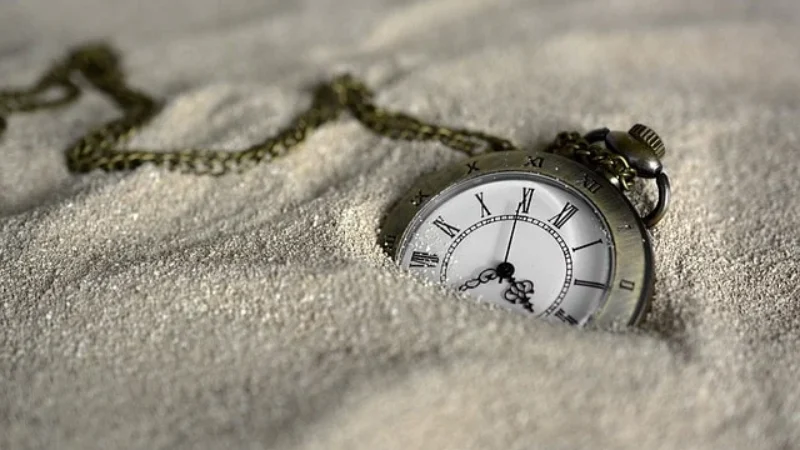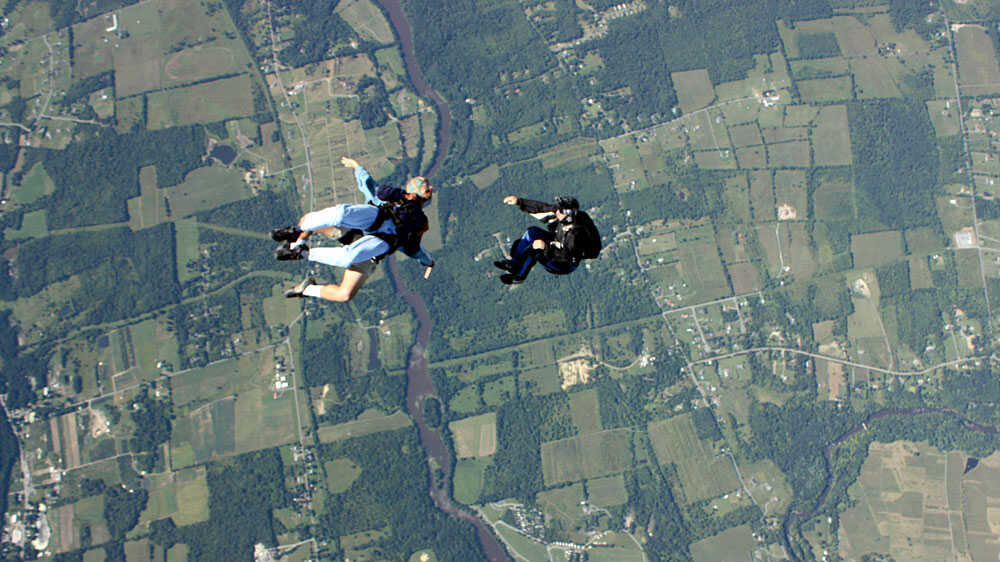What If Time Perception Was Erased From Our Surroundings

Imagine what would happen if the concept of time was removed from our walls, from our wrists, from mobile phones, from laptops. Two important experiments were conducted on the perception of time. One involved an athlete who locked herself in a cave for 500 days. The other was where a scientist asked people to jump from a height of 150 meters for his research.
Living 500 Days in a Cave

In April 2023, athlete Beatriz Flamini stayed alone for 500 days in a 70meterdeep cave. The purpose of this experiment was to observe how the human sense of time changes without sunlight or human interaction. Inside the cave, she used to knit, read, draw, and exercise. For about 65 days, she tried to keep track of the days. But after that, she lost count. When her team came to get her after 500 days, she felt that only 160 or 170 days had passed.
The Experiment with Jumping From 150 Meters

Now, coming to the second experiment—look at my wrist, it’s a bit different, slightly protruded. That’s because, back in 12th grade, I was going to tuition on a scooter. The scooter was at speed, a speed breaker came, I missed it—the scooter flew in one direction, I flew in another. And that whole scene happened in slow motion for me. I remember every detail, even today.
You may have felt this too—that during accidents or lifethreatening situations, everything seems to slow down and stays in memory. This exact phenomenon intrigued David Eagleman. He conducted a skydiving experiment where he asked students to jump from a height of 150 meters. Flashing numbers were attached to their wrists. These numbers appear blurry in normal conditions but can be read clearly if perceived in slow motion. However, none of the participants could read the number while falling.
This means: our brain doesn’t actually slow down; time doesn’t actually slow down. So what’s the reason? The reason is, every moment, a lot is happening around us, but our brain doesn’t document everything. When something threatening or extraordinary happens, the brain and memory become alert, observe every detail, process every emotion, and we feel as though time has slowed.
Why Time Seems to Fly as We Age

The world’s richest man, Elon Musk, can buy everything—an island, maybe even a planet—but he cannot buy time. The same time that feels fast for one and slow for another.
Remember how time in childhood used to feel endless? Summer holidays felt long. Even after doing everything, time remained. Now we say, “I don’t know how 2024 passed and 2025 arrived.”
We grow up. Then come careers, marriage, responsibilities, kids—and when we look back, we wonder, “Where did time go?” Life feels like it has been on fastforward. We feel life is too short; there was so much left to do and experience.
At the beginning of 2025, I felt the same—that I didn’t even realize where 2024 went. I had many questions about time perception. I did some research and found a few things I want to share with you. After this, you’ll deeply experience every moment—you won’t just spend life, you’ll truly live it. And when you look back a few years later, there won’t be regret like, “When did time fly? When did I grow old?”
Three Important Concepts About Time

This article brings you three important insights
1. The AgeTime Illusion – Why time felt slower in childhood and speeds up as we age
2. The Time Trap – How we’re getting caught in time illusions
3. A Neuroscience Hack – How to slow down time and enrich your life
The AgeTime Illusion

Imagine someone who’s been doing a job for a long time. If we ask them what they remember from recent days at work, chances are they won’t remember much. They’ll say time just flew by—same work, same routine, same emails, same boss, same office. Life becomes predictable.
But if you ask them about their first day at work or their first day in college, they’ll remember everything. Because everything that day was fresh—every moment was new, every second mattered.
We may be physically present in life but mentally disconnected. As we grow older, life becomes repetitive: same work, same routine, same “Good morning, sir.” Childhood was full of firsts—first bicycle, first ride, first trip, first crush. These new experiences stretch our perception of time.
When the brain receives something new, it closely tracks and processes it. That’s when we feel time. This is called the Oddball Effect—unexpected events feel longer. That’s why “1 minute” can feel like an hour, depending on which side of the bathroom door you are on.
Personal Story and the Oddball Effect

While researching time, I talked to a couple. They once lost their 3–year-old son at a wedding. It took 15 minutes to find him—but those 15 minutes felt like hours.
As we age, our novel experiences reduce. Dopamine spikes lessen.
The excitement of the first salary is strong, but the 10th, 15th, 20th—not so much. The more we chase stability, the more predictable life gets. And the more predictable life is, the faster time slips by unnoticed.
In one video I saw, people of different ages were asked to guess when one minute had passed. A timer was running.
The observation?
Older people were off in their guesses. Younger participants guessed more accurately.
VibeMotive
Time perception changes with age.
The Time Trap – Digital Numbness

In a research study by Dinkar Sharma and Lazaros Gkedis, social media users were observed. They didn’t realize how quickly 10 minutes became 30 or 40. You may have experienced this too—just one episode on Netflix turns into three or four. Scroll one reel, then another, and suddenly hours have passed.
This is Digital Numbness, silently stealing your time.
And it’s not just about time. A strange feeling also emerges—“Where did my day go?”
Because scrolling and bingewatching offer microdoses of novelty—small dopamine hits. It feels exciting for a moment, but it creates no strong memory. That’s why time fastforwards.
Meanwhile, those who engage in realworld activities like traveling, cooking, exercising, or exploring feel that time has slowed. Think about it—scrolling reels doesn’t compare to exploring a new city. One just consumes. The other adds layers to your memory.
Why Time Perception Matters
Studies on old age—like those by Bronnie Ware or Harvard’s longrunning study on happiness—revealed that people’s regrets in life are rarely about money or career. Most regret neglecting relationships or their own happiness.
There is no “later.” Don’t put off living for “some day.”
Imagine the final evening of life. The sun is setting. You’re reflecting. The only question will be: Did I really live my life? Or did I keep waiting for someday?
You Control Life’s Speed With This Two things will help:

1. A Realization – That time slows when you become mindful of your life
2. A Neuroscience Hack – Add “Mindful Novelty” to your life
The Realization
Time slows when you start observing your life closely. Life is like a camera—if you don’t focus, it all looks blurry. But if you capture moments, observe them, focus on them—life becomes vivid.
Just realizing that your life is important and precious shifts your focus to the present.
The Neuroscience Hack – Mindful Novelty

Einstein said: “Put your hand on a hot stove for a second—it feels like an hour. Sit with a beautiful girl for an hour—it feels like a second.”
Time perception isn’t just about clocks; it’s about attention and experience.
So instead of waiting for something new and big to happen someday, create mindful novelty in your life.
Here are five ideas:
1. Create Firsts
Remember learning to ride a bicycle? The excitement, the falls, the pride. Those moments are memorable because you lived them.
Recently, I went to Goa again (been there 15–20 times). But this time, I decided to add “firsts.” Ordered a dish I’d never tried. Did kayaking for the first time.
Even without spending money, you can create “firsts”: try a new hobby, cook something new, start a new skill or art form.
2. Try Small but New Things
If you take the same route daily—same street, same tea stall—try changing it once. You’ll notice new signs, people, maybe a temple or building you never noticed before.
Try a new tea flavor. Listen to a different music genre. Try a new workout like bhangra instead of HIIT.
These small changes activate new brain pathways and make time feel slow and memorable.
3. Travel and Explore
Travel breaks life’s monotony. And no, you don’t need to go to Goa or Switzerland. Explore a nearby lake or a new park in your city.
New sights, smells, people—your brain absorbs and rewires.
Remember: Even Shri Ram didn’t see his exile as punishment—it was a transformative journey.
Travel adds stories to your life. You’ll have memories of train delays, missed flights, surprise moments, and stunning views.
4. Take Back Control of Your Time
In ancient Rome, spectacles were used to distract the public from important issues—people would watch animals being hunted, punishments carried out. Our phones are modernday spectacles.
When you are fully present, you create real memories. But now we’re multitasking everything—scrolling phones, watching TV, chatting—all at once.
It’s like a bucket with tiny holes—drop by drop, water disappears. Same with distractions and notifications—they silently empty our day.
These apps are built by top neuroscientists and psychologists to make you stick. If you feel your time is slipping away, start living part of your day without screens.
Block specific time for WhatsApp, social media. Don’t be available 24/7. This will boost your productivity, mental health, emotional strength—and stretch your time perception.
5. Live Life Like a Movie
Movies teach us that even ordinary scenes can look extraordinary if captured well.
So, see your life like a movie timeline. Some scenes will be dull, some painful. But how many can you make interesting?
No, there won’t be a romantic rain dance or bulletdodging like in films. But think—how is your life’s movie playing out?
How can you make it worth watching? Because when it becomes worth watching, your life becomes worth living.
Final Thought
No matter how fast life has gone till today whether it’s 5 years, 10 years, or more when you look back from the future, may there be more memories than regrets.
Live your one life fully. That was the intent. That was the effort.
VibeMotive


















1 Response
[…] And if you studied for 5-10 minutes, after that all your mind’s distractions, your mobile phone distractions, all those distractions will end and you can easily study with focus. This is our step number one, the 10-minute rule. Start following the 10-minute rule from today, from now. Whenever you’re getting distracted, tell yourself we’ll just study for 10 minutes, just study for 10 minutes. Then see, distraction will automatically end. […]